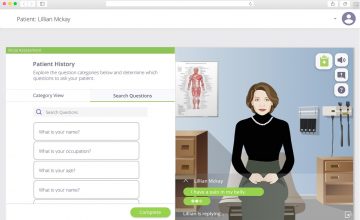
How a made-at-UBC technology could shape the future of medical education.
Whether it’s taking a patient’s medical history or performing a physical exam — the first clinical encounter can be a stressful experience for many medical students.
But now, thanks to a web-based learning platform known as CyberPatient, students will be able to gain the confidence they need by interacting with animated patients in a virtual world.

“This is a one-of-a-kind, UBC invention that has the power to really revolutionize medical education here in Canada, but also around the world,” says Dr. Karim Qayumi, a professor in the UBC faculty of medicine’s department of surgery and the platform’s creator.
With the new tool at hand, users — ranging from medical students to health care professionals — can enter into a virtual doctor’s office or emergency room that mimics the real-world experience.
Over the course of a single cyber training session, users follow their patients through the continuum of care, taking medical histories, performing physical exams, ordering tests and ultimately diagnosing and offering a comprehensive treatment plan. At the end of a session, users are scored and given thorough feedback on every step — or misstep — they’ve made.
The software behind CyberPatient was first designed at UBC nearly two decades ago. The technology was recently licensed to Interactive Health International (IHI), a Vancouver-based start-up that has grown CyberPatient from a prototype, with only a handful of digital clinical cases, to a state-of-the-art educational tool. In November, IHI, also founded and led by UBC’s Dr. Qayumi, will launch CyberPatient commercially, with more than 120 cases.
“This is a one-of-a-kind, UBC invention that has the power to really revolutionize medical education here in Canada, but also around the world.”
Dr. Karim Qayumi
Early adopters of the learning tool are excited by what they see.
“It’s a really interesting platform that gives you the opportunity to make progress on your own time,” says Katie Baillie, a first-year UBC medical student who tested CyberPatient before it’s commercial launch.
The idea for the platform was planted decades ago when Dr. Qayumi, then director of the Vancouver General Hospital Simulation Centre, recognized the educational and economic benefit of creating a platform that would allow students to sharpen their clinical decision-making skills anytime, anyplace, and at a fraction of the cost.
CyberPatient allows users to sharpen their clinical decision-making skills anytime, anyplace.
“Many of our existing training options, like simulation mannequins and standardized patients, come with a big price tag. And while nothing can beat the experience of training in a real-life setting, the beauty of CyberPatient is that it allows students to overcome some of their nervousness and learn from their mistakes before ever meeting a real patient,” says Dr. Qayumi. “Essentially, it’s helping bridge the gap between theory and practice in medical education.”
The potential impact of CyberPatient is not just limited to medical schools and hospitals in Canada and other developed nations of the world.
In fact, Dr. Qayumi, who was born in Afghanistan and who has dedicated much of his life to supporting the medical needs of low-resource countries, hopes to see the platform expanded and adopted to nations all over the world.
In an effort to see his vision fulfilled and transform health for everyone, Dr. Qayumi will be offering CyberPatient to developing nations of the world for free through IHI’s non-profit affiliate, CanHealth International.
“I know how difficult it can be for people in some countries to reach the level of education that we all enjoy here. It’s my duty to make a difference to human beings around the world and I’m very fortunate that UBC has inspired me and supported me along the way,” says Dr. Qayumi.





